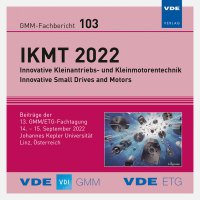Real-time AI-based Temperature Estimation of Small Electric Drives
Konferenz: IKMT 2022 - 13. GMM/ETG-Fachtagung
14.09.2022 - 15.09.2022 in Linz, Österreich
Tagungsband: GMM-Fb. 103: IKMT 2022
Seiten: 6Sprache: EnglischTyp: PDF
Autoren:
Sarcheshmeh, Saeed Farzami; Koenig, Niklas; Nienhaus, Matthias (Laboratory of Actuation Technology (LAT), Saarland University, Saarbrücken, Germany)
Asmussen, Sven-Erik (SHARE am KIT, Schaeffler Technologies AG & Co. KG, Karlsruhe, Germany)
Inhalt:
This work shows how methods based on artificial intelligence (AI) can contribute to a suitable real-time temperature estimation in small electric drives. The safe operation and precise control of electric drives, especially small permanentmagnet synchronous motors (PMSM), strongly depends on power losses and heat processes inside the machine. Since small electric drives have a relatively more complex and compact internal structure as well as relatively short thermal time constants, measuring the important component temperatures of the machine using thermal sensors is complex and expensive. For this reason, a real-time temperature estimation with sufficient accuracy is desirable. While thermal models based on physical principles have been widely explored, the performance of thermal models based on machine learning algorithms is still relatively unclear. For this reason, this work has investigated the applicability of different types of artificial neural networks (ANN) for the temperature modelling of a small PMSM, due to their suitability in accurately modelling and estimating the time series. It has been found that the performance of the trained thermal models, especially thanks to the feature engineering, is comparable to the state of the art in PMSM temperature estimation (e.g., using lumped parameter thermal network (LPTN) approaches). Through the best-trained thermal model, for example, the stator winding and stator yoke temperatures could be estimated with a mean squared error (MSE) of less than 3 and 2 K2, respectively. In addition, the performance of the best-trained thermal model is evaluated on the test bench in realtime, and its generalization capability is validated as well.


